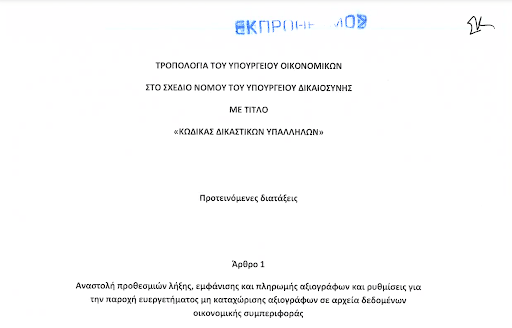

Vouliwatch’s investigation shows that the Parliament fails to stamp as overdue dozens of ministerial amendments, even though they are submitted at the last minute, in violation of both the Constitution and the Rules of Procedure of the Parliament.
Legal provisions on overdue amendments
Aiming at the adoption of rules for good and transparent legislation, Article 74 para 5 of the Constitution, as well as Articles 88-89 and 101 para 5 of the Rules of Procedure of the Parliament stipulate that ministerial amendments to proposed bills must be submitted, at the latest, three days before the opening of the debate in the Plenary or the competent parliamentary committee. Late submissions can not be introduced for discussion or voting in Parliament.
The purpose of the above rules is to allow enough time for the proper legislative and consultation processes to be followed, allowing input both from MPs and from the public – of any regulation proposed by ministers in the form of amendments. The prohibition of overdue amendments prevents the submission – shortly before the passage of the bill – of regulations that will inevitably escape the attention of the public sphere, resulting in a lack of transparency and accountability on issues that affect individual rights, public procurement and other issues that will influence the lives of millions of citizens.
July 2019-September 2021: Over 64% of amendments are submitted at the last minute
Despite the importance of these rules for democracy and the rule of law, in 2021 the government submitted a large number of late amendments. According to the research we conducted for this article, from July 2019 to September 2021, a total of 377 amendments were tabled, of which 244, i.e. over 64%, were overdue.
In this analysis,we followed the most moderate parliamentary method for defining amendments as ‘overdue,’ and judged as such only those that were submitted on the day of or the day preceding the voting of the relevant bill. If we applied the letter of the law and considered as overdue the amendments that were not tabled at least three days before the beginning of the debate, then the percentage of overdue amendments would be much higher.
To put into context the widespread application of this unconstitutional practice, we give the example of the bill that was passed last April for the new Code of Conduct of Judicial Officers, to which the government tabled eight amendments. Of these, six were overdue, while all of them regulated, again in violation of the law, issues unrelated to the main object of the bill, such as the number of students admitted to universities; the increase in public spending on the maintenance of military equipment; retirement issues; municipalities’ budgets, and the manner of appointing the President of the Anti-Money Laundering Authority.
The six overdue amendments had a total length of 260 pages, including accompanying texts such as the explanatory memoranda. The sheer volume of the regulations that were submitted to Parliament at the last moment raises doubts as to whether MPs would have had the chance to study in depth these amendments that had been tabled such a short time before voting was due to start. In fact, two of them were submitted to Parliament on the day of the vote and the other four just the day before.
“OVERDUE”: A simple transparency mechanism that is not being applied
Despite the fact that submitting overdue amendments is a widespread practice, Parliament has a transparency mechanism to highlight this unconstitutional practice. This rule stipulates that the documents relating to the amendment that are posted on the parliament’s website are accompanied by an “OVERDUE” stamp, so that citizens can easily see when an amendment was tabled, and ultimately passed, in violation of the law.
Take as an example the last amendment to the bill concerning the above-mentioned new Code of Conduct of Judicial Officers. It was submitted late by the Ministry of Finance, coming to Parliament on the afternoon of the day the bill was passed. For this reason, the document was accompanied by the “OVERDUE” stamp on its front page.

By making this clear to the public, the correct and consistent labeling of late submissions could act as a deterrent, as ministers are called to account for their unconstitutional practices to citizens and the opposition.
However, instead of strengthening the application of such rules of transparency and accountability in cases where Parliament and the government do not legislate in accordance with the law, Vouliwatch’s study of the amendments concluded that Parliament does not consistently apply this simple transparency mechanism.
Indeed the Parliament, for reasons unknown, has stopped stamping a large number of late amendments. Our research shows that 52 of the 79 overdue amendments submitted in the first nine months of 2021, i.e. 65.8%, did not bear the”OVERDUE” stamp.
Why do overdue amendments become laws?
This raises the question of why overdue amendments become laws, even though they are tabled in a manner that violates the law. The answer, which also explains why there are systematic breaches of the rules on amendments, is the lack of legal consequences.
Indeed, the violation of the provisions of the Constitution and the Rules of Procedure of the Parliament for amendments does not have any consequences, because it is not subject to judicial control. This applies to not only the regulations for amendments, but in general, all the organizational provisions of the Constitution, including the provisions that shape the rules of operation of the Parliament.
The lack of legal consequences for the violation of the rules of operation of the parliament is based on the theory of internal affairs of the Parliament, also known as the theory of interna corporis, according to which, the violation of the procedural rules concerning the law-making process is not controlled by the courts, as the legislature should function independently of the judiciary in the context of the separation of powers.
According to Spyros Vlachopoulos, a Professor at the Law School of the University of Athens, the courts won’t exercise control over the violation of legal provisions for legislative amendments: “a judge will take on any violations of fundamental and individual rights, however, they will not deal with the provisions of the Constitution concerning the organization and operation of Parliament.” This mentality is based on the perception that the organizational provisions of the Constitution have to do with the exercise of politics, in which judges should not be involved.”
This conclusion is also reinforced by the fact that the jurisprudence makes a formal interpretation of Article 74 paragraph 5 of the Constitution – which states that in case of dispute over the issue of amendments, “the Parliament decides” – supporting the idea that only the Parliament can judge the issue of amendments.
However, the above approach has been criticized on the basis that in the case of overdue amendments, we are not dealing with the judiciary intervening in politics, nor are we dealing with the internal affairs of the parliament in the sense of interna corporis, (which remains out of the scope of judicial control). On the contrary, what is required in this case is the enforcing of the content of the Constitution, and whether or not the law is being implemented
According to Mr. Vlachopoulos, “this is not a matter of politics, it is a matter of legal certainty, which is inextricably linked to the concept of the rule of law.”
“Devaluing Parliament and the Constitution”
It is noteworthy that in a legal article in 2012 (“The financial crisis as an element of deregulation of the hierarchy of sources of law: Inevitable or otherwise?” Legal Step, December 2021) the Professor of Constitutional Law and current Minister of State George Gerapetritis had commented on the practice of submitting late amendments. Speaking of “devaluing the Parliament and the Constitution”, Mr. Gerapetritis noted at the time that very few laws “meet the conditions of cohesion as required by Article 74 para 5 of the Constitution”, an article that defines the provisions for amendments. According to him, one of the manifestations of the degradation of legislative work is “the mass submission of various last-minute amendments, which the members of the governing majority are usually required to draft, without the possibility of any substantial elaboration process or scrutiny”.
In fact, in his legal analysis, the current Minister of State took it a step further, calling the ‘interna corporis’ theory “outdated,” while criticizing the parliamentary majority, which, “having the assurance that procedural issues will not suffer the torment of judicial constitutional review, feel the weight of the constitutional limits set out for parliamentary procedure much less.”
Bank Account number: 1100 0232 0016 560
IBAN: GR56 0140 1100 1100 0232 0016 560
BIC: CRBAGRAA
![]()
In a time where the very foundations of democracy are gradually being eroded by the rise of extreme nationalism, alt-right movements, the spread of disinformation and corporate capture, the efforts of organisations such as Vouliwatch are more relevant than ever.
We rely on the generosity of each and every one of you to continue with our efforts for more transparency and accounta
By financially supporting Vouliwatch you support our litigation strategy, our campaigns for transparency and accountability in the political system, the development of new civic tech tools, our research projects and last but not least our impartial and accurate